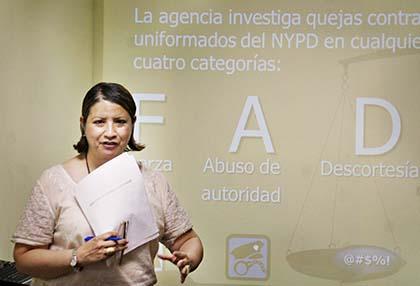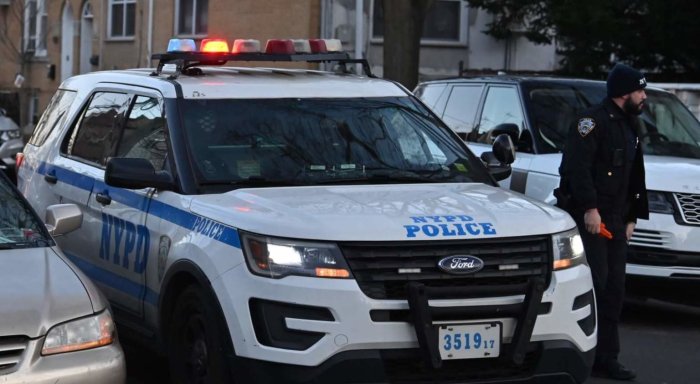By Joe Anuta
Many immigrant residents in Corona complained about harassment from the NYPD when a worldwide think tank took a survey earlier this year, so in response the organization brought in a watchdog agency to speak about police harassment Sunday.
Dawn Fuentes does outreach for that city agency, called the Civilian Complaint Review Board, a mayoral board that investigates allegations against officers.
“It’s important that we’re here,” she said to the sparse crowd at a temporary community center, at 108-59 Roosevelt Ave. “We’re supposed to keep checks and balances to make sure there is not an abuse of power, in this case by the NYPD.”
Fuentes had her presentation translated into Spanish and brought volunteers to act out scenarios that might apply to what the board does.
One area in which the board takes complaints is when officers use excessive or unnecessary force, Fuentes said.
Another is when an officer abuses his or her power, for example, by stopping and frisking a civilian without reason.
“Stop and frisk is controversial in New York state,” Fuentes said. “Officers can stop, but there has to be a justifiable cause.”
The board also reviews complaints alleging that officers used discourteous language or epithets involving a person’s race, ethnicity or sexual orientation.
“There is never a justifiable reason for using an epithet based on race,” Fuentes said.
The board is composed of 13 members appointed by the City Council and representing a mix of NYPD, civilian and civic leaders from all five boroughs.
And the board has real power.
It can subpoena records from the NYPD to investigate cases.
If a complaint is reviewed and an officer is found to have committed misconduct, the board can make a recommendation to the NYPD that an officer lose his or her job.
Less serious recommendations include losing promotion possibilities, losing vacation time or assignment to cultural sensitivity training. No matter what the outcome, the mere fact that an officer had a complaint filed will remain a permanent part of his or her record.
But if an investigation seems too serious, Fuentes said a mediation program brings the officer face to face with the complainant to talk about the issue.
“It seems to have a high satisfaction rate on both sides,” she said.
The program was put on by the Ghana Think Tank, an organization that attempts to solve local problems in developed countries like the United States.
One of their solutions to the complaints of police harassment was to host the talk.
After many residents complained about getting tickets for loitering, the organization put up signs that read “legal waiting place.”
Some other solutions for police harassment, such as forming political action committees, were suggested by other think tanks from around the world.
Ghana Think Tank partnered with another organization called Immigrant Movement International, which is running the Roosevelt Avenue community center for one year.
Reach reporter Joe Anuta by januta@cnglocal.com or by phone at 718-260-4566.



































